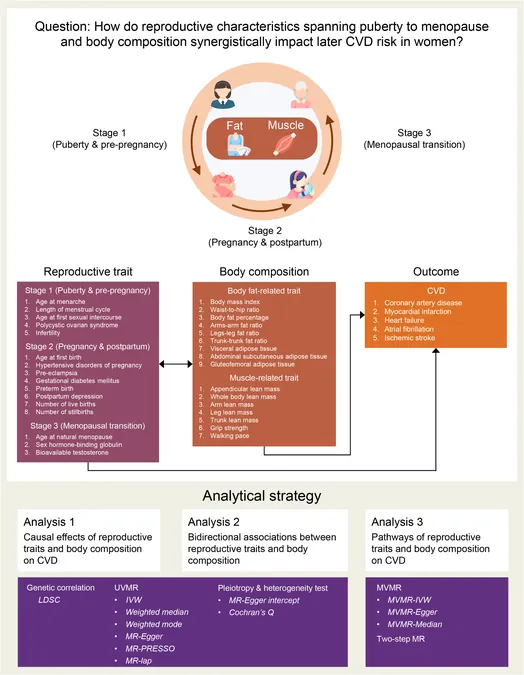
The Hidden Link: How Women's Reproductive Health Influences Heart Disease
2025-04-18
Author: Daniel
Understanding Women's Reproductive Stages and Heart Health
Women experience distinct reproductive stages from puberty to menopause, significantly impacting their health, particularly cardiovascular health. Factors like polycystic ovary syndrome (PCOS), pregnancy complications, and menopause are crucial in understanding heart disease risk later in life.
The Connection Between Body Composition and Cardiovascular Disease
Research indicates that different reproductive stages affect body fat and muscle composition, influencing cardiovascular disease (CVD) outcomes. For instance, during puberty, girls typically gain more fat compared to boys, and women see significant weight gain, especially in midlife. These body composition changes may hinder metabolic health and increase CVD risk.
A Revolutionary Study: Mendelian Randomization
Recent studies using Mendelian randomization (MR) have begun to unravel these complex relationships. By analyzing genetic variants, researchers can assess the causal link between reproductive health indicators and body composition, ultimately shedding light on CVD risk.
A Two-Step MR Study: Insights into Reproductive and Cardiovascular Health
In a groundbreaking two-step MR study, scientists examined 16 reproductive traits and their impacts on CVD by systematically analyzing genetic data from extensive women-specific studies. This comprehensive approach could redefine how we approach prevention and treatment of heart disease in women.
Genetic Correlations Unearthed
The study revealed that reproductive health markers—like age at menarche and pregnancy complications—are intricately linked to body composition traits such as body fat percentage and muscle mass, leading to varied risks for conditions like coronary artery disease and heart failure.
Crucial Findings on Bidirectional Associations
The analysis identified numerous bidirectional associations between reproductive traits and body composition, suggesting a complex interplay that influences CVD risk. For example, body fat may mediate the effects of reproductive traits on heart disease, highlighting the need for integrated healthcare strategies.
Empowering Women Through Knowledge
The findings stress the importance of recognizing women's reproductive milestones as potential risk factors for later cardiovascular issues. This research paves the way for targeted interventions, underscoring the need for customized healthcare approaches that empower women to manage their cardiovascular health.
What Lies Ahead?
As we venture further into understanding the connections between reproductive health and heart disease, it’s crucial to continue exploring these associations across diverse populations. This groundbreaking study not only enhances our understanding of women’s health but also advocates for strategic interventions that can significantly improve cardiovascular outcomes.
 Brasil (PT)
Brasil (PT)
 Canada (EN)
Canada (EN)
 Chile (ES)
Chile (ES)
 Česko (CS)
Česko (CS)
 대한민국 (KO)
대한민국 (KO)
 España (ES)
España (ES)
 France (FR)
France (FR)
 Hong Kong (EN)
Hong Kong (EN)
 Italia (IT)
Italia (IT)
 日本 (JA)
日本 (JA)
 Magyarország (HU)
Magyarország (HU)
 Norge (NO)
Norge (NO)
 Polska (PL)
Polska (PL)
 Schweiz (DE)
Schweiz (DE)
 Singapore (EN)
Singapore (EN)
 Sverige (SV)
Sverige (SV)
 Suomi (FI)
Suomi (FI)
 Türkiye (TR)
Türkiye (TR)
 الإمارات العربية المتحدة (AR)
الإمارات العربية المتحدة (AR)